"They laid there side by side." The life and death of a family of eight, whose graves were found in Izium
Izium. 9 March 2022, 7:00. The house on 2 Pershotravneva street, in basements of which dozens of people are hiding, because Russians are attacking it with tanks and aviation afterwards. Only two last entrances survived. More than 50 people were killed.
Halyna Zhykharieva had been coming to the ruins of this house for a month and a half. Russian soldiers banished her, but she came there every day and prayed for her close ones to survive. The last hope vanished when they started to remove the rubble and recover bodies. Eight people, close to her, were dead.
A photo of this family’s grave went viral online. Those are the deceased people:
Dmytro Stolpakov - 33 y.o.;
Olena Stolpakova - 31 y.o.;
Oleksandra Paniukhno - 8 y.o.;
Olesia Stolpakova - 5 y.o.;
Mariia Zhykharieva - 13 y.o.;
Oleksandr Zhykhariev - 49 y.o.;
Tetiana Zhykharieva - 49 y.o.;
Liudmyla Sokol - according to the preliminary information, she was more than 70 years old.
Only now, when the city is liberated from Russian occupiers, the world has got to know about this tragedy.
We are telling you the story of a family, killed by Russians.
[BANNER1]
"I still remember his cheerful smile…"
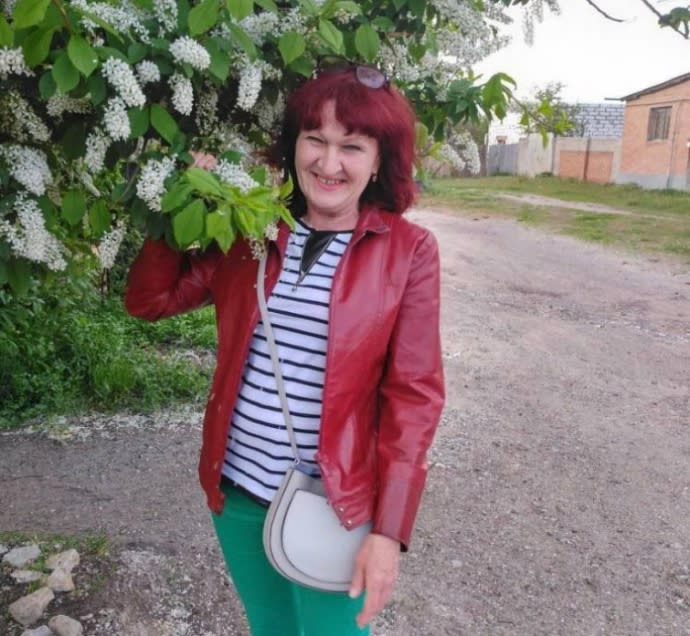
59-year-old Marharyta Smoliarova is a mother to 33-year-old Dmytro Stolpakov. She has been living and working in Poland for the last five years. She saw her son, daughter-in-law Olena and granddaughters Oleksandra and Olesia right before the war. She was back home for winter holidays. Marharyta left Izium on 17 February.
The mother reminisces about Dmytro with warmth in her voice. The son was born in Kapytolivka near Izium, went to school there as well. He was keen on natural sciences, especially maths. He had been growing up without a father for a long time.
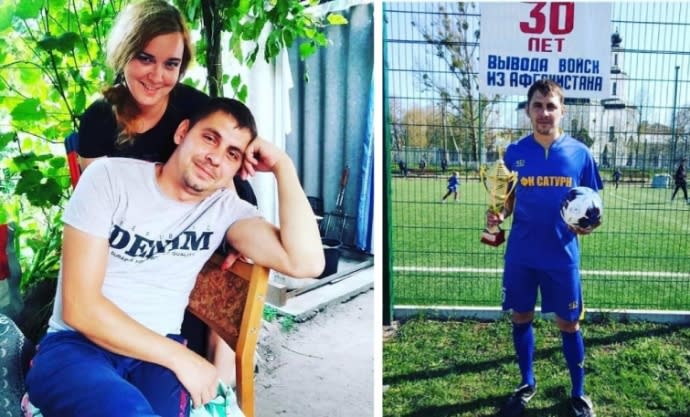
"He is a good-looking boy. He did sports, played football for teams of the Izium district. He went fishing since his childhood, even though he did not eat fish. What he liked to eat was my borshch and fried potatoes," Marharyta says.
Now, places where Dmytro liked to go fishing are partially bombed.
Marharyta also remembers how the son went into the woods for mushrooms with her. Only the two of them went to the local forest. They discussed education, girls, football on the road. Dmytro often listened to his mother’s advice.
Anna Sliusarenko, Dmytro’s classmate, recalls the deceased as a very energetic and cheerful person.
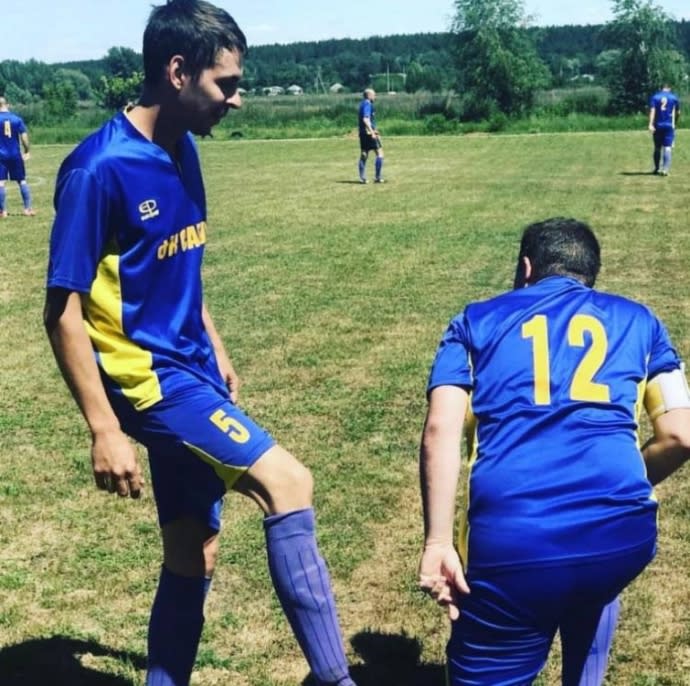
"I remember his smile when he got on the field. The Stolpakovy brothers [other Dmytro’s brother died a few years ago - ed.] were tall and handsome. All girls in the school had a crush on them," Anna recollects.
"After the 9th grade, Dmytro got into Izium agrarium lyceum 61 on the specialty "agronomist". He did not go to university. It was a hard time, so he needed to work," the man’s mother says.
Since his youth, the son earned money on constructions. Then, he started to go working abroad. Lately, he was working at the sawmill in Izium.

Dmytro met his wife Olena online six years ago, even though they lived not far away from each other in Izium. They had been dating for approximately six months. Shortly after that, Dmytro showed a photo of Olena to his mother, and confidently stated: "I really like Lenochka [diminutive appeal to Olena - ed.], so there are no options; accept my choice, mom, I am getting married."
"We lived together in friendship. Lenochka is not my daughter-in-law, she is my daughter," Marharyta Smoliarova says.
[BANNER2]
"Lena was sociable, gathered friends around her"
Olena Stolpakova was born on 1 February, 1991 in Izium. Together with her parents, Oleksandr and Tetiana Zhykhariev, she lived in a house on 2 Pershotravneva Street. Dmytro Stolpakov was her second husband. Olena had a daughter, Oleksandra Paniukhno, from her first marriage. Olena’s second husband raised a step-daughter as a family member and loved her very much.
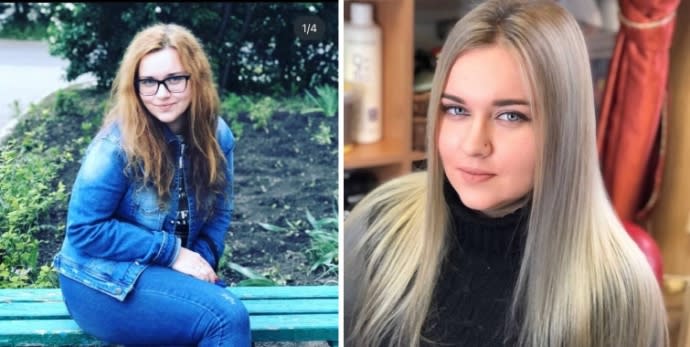
Olena Stolpakova
Olena Stolpakova received a secondary professional education, she studied to be an accountant. Later, she entered one of Kharkiv's universities, was a student, and at the same time worked as a manager and product specialist in one of Izium supermarkets.
Relatives say that the woman cooked well and loved to set the table.
"I remember when I had my birthday, Lena was pregnant with Olesia [younger daughter – ed.], she went to another part of the city to set the table and serve it. It was all for my sake. Her specialities were cabbage rolls and mushrooms. Dmytro, on the other hand, liked to collect the mushrooms. Her husband was catching so many fish that Elena often said that she didn't know where to put it anymore," as Tetiana Lunina, a friend of Lena and the family, recalls.
Yevhen Samotukha, Tetiana's ex-husband, lived in the same house as the Stolpakov family. Tetiana and Olena met when both were pregnant, and since that time, they had been friends.
"Olena didn't like to just be at home. She always called me to go for a walk, go to the river, or go on a boat ride. Dmytro was literally "obsessed with football". Yevhen and Dmytro both played for the Kapytolivka Saturn team. We were always invited to matches," Tetiana recalls.
According to her friend, Olena Stolpakova was a creative person as well. She made decorations for birthdays and souvenirs on order and also loved to dance and sing.
"They had karaoke equipment at home and we sang," says Tetiana Lunina. "Lena was sociable, she always gathered friends around her. We had been meeting even in difficult times to support each other," says Tetiana.
"They were good girls"
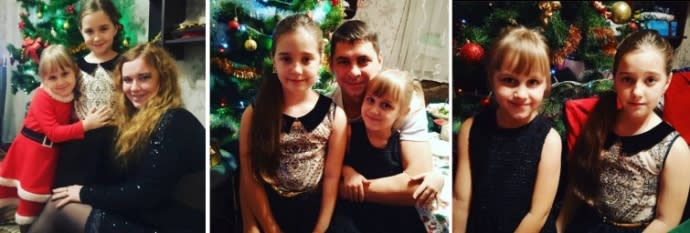
The Stolpakov family celebrates the New Year and makes plans for 2022
Olena’s eldest daughter Oleksandra was born on 22 August, 2013, and youngest Olesia, on 27 April, 2016.
"We raised Sasha from the age of one. She finished the 5th grade, and Olesia was supposed to go to the first grade just this year - to the same school that their mother went to, across the street from the house. They were good girls," - Girl’s grandmother Marharyta recalls her grandchildren through tears.
Oleksandra attended a dance club and performed on stage.
Tetiana Lunina, a friend of the family, says that she especially remembers Sasha's (Strange Flower) dance.
"It was a very beautiful patriotic dance, beautifully choreographed," says Tetiana. Her daughter Polina also attended this dance studio, where Modern and Ukrainian folk dances were taught.
Dyvna Kvitka Dance, on YouTube channel of Olena Stolpakova:
5-year-old Olesia went to kindergarten. She loved dancing and singing as well. When grandmother Marharyta came from Poland, the girls spent a lot of time at her place in the village of Kapytolivka.
"We walked together, went to the cinema," Marharyta recalls.
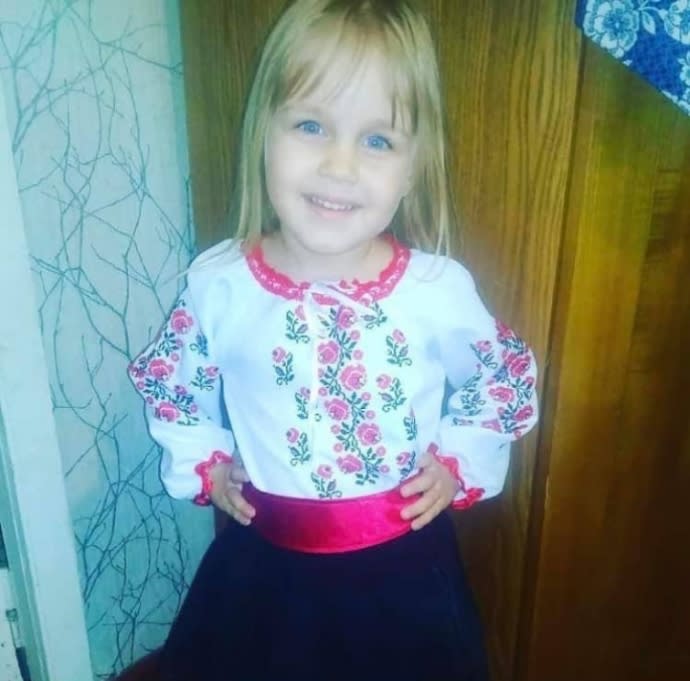
Olesia Stolpakova, photo from family archive
Oleksandra took care of her younger sister. She helped her mother when Olesia was just born: changed diapers, looked after the baby.
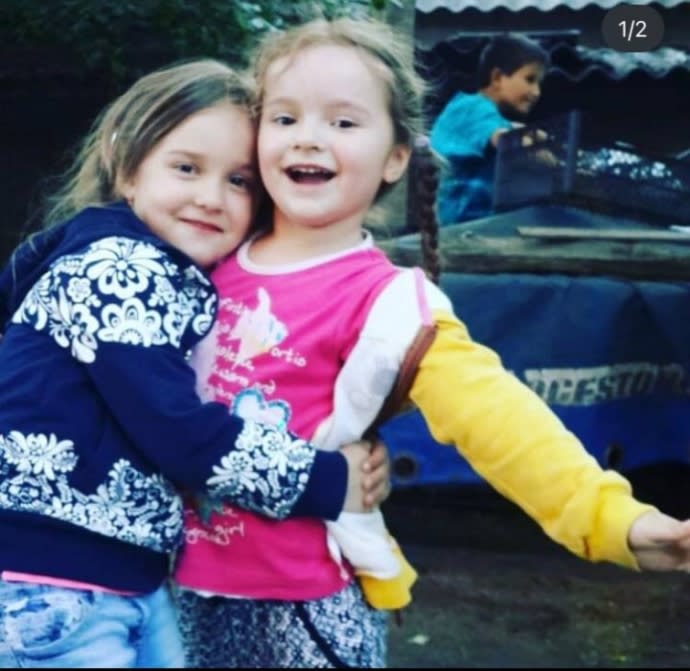
Oleksandra and Olesia had different tempers, but they loved each other very much
The sisters loved each other, although they had different tempers. According to relatives, Oleksandra was more moderate and obedient, but Olesia was a restless, cheerful chatterbox. Like most children of their age, they were "stuck" in gadgets, played with dolls, drew, in a nutshell, lived and enjoyed life.
"Half of Izium used to buy shoes at aunt Tania and uncle Sasha."
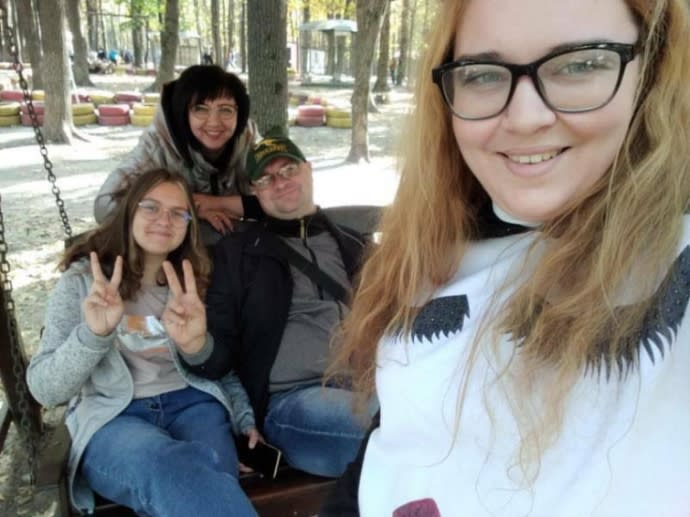
The Zhykhariev family: Oleksandr, Tetiana, Olena and Maria
In one entrance of the house on Pershotravneva Street 2, but on the other floor also lived Olena Stolpakova's parents: Oleksandr and Tetiana Zhykharievy with their young daughter Maria.
"They constantly went to visit each other. I also often stopped by uncle Sasha and aunt Tania's. There was even one funny case. Once in Olena's apartment, they went out on the balcony and accidentally locked themselves there. The children couldn't help us. We called uncle Sasha, and he opened us up"— says Tetiana Lunina.
The Zhykhariev were born in the same year and month: Oleksandr – on January 4, 1973, and Tetiana – on January 16.
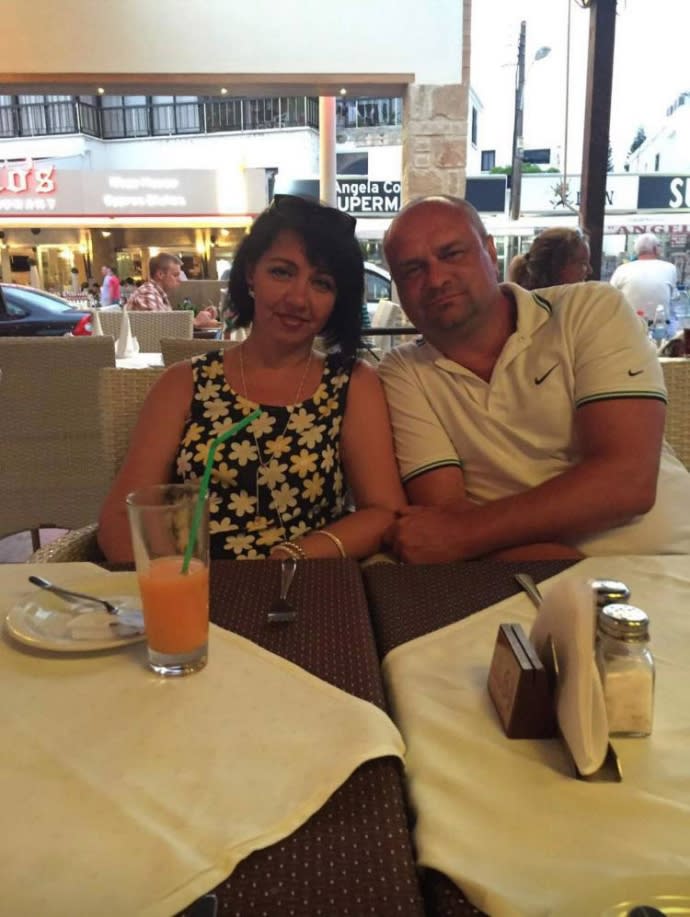
Oleksandr and Tetiana Zhykharievʼs were together every day, and they werenʼt getting tired of each other
They were entrepreneurs. They were selling children's shoes at the Central Market. They also had their store "Yarkyi Ya" (Bright me). According to Tetiana, half of Izium bought shoes from them at their shop.
"It was a family business. First, we traded at the market, and then, when things went up, we opened a store. Everyone was engaged in business, even Oleksandr's mother—grandmother Halyna"—recalls Olena's friend Tetiana.
[BANNER3]Oleksandr was a kind and positive person. When my friends Olena and Tania were sad, I could always cheer them up. He helped and supported his daughter at the first call, but never interfered in the relationship between Olena and Dmytro.
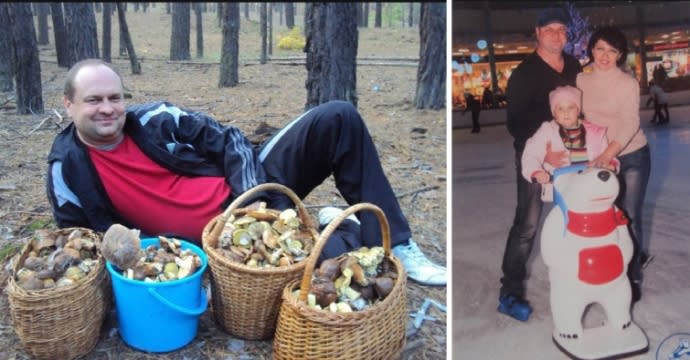
Oleksandr Zhykhariev loved picking up mushrooms and spending time with his family
On the social networks, man – many photos from a family holiday. Together with his wife, they liked to pick up mushrooms, walk in nature, and go abroad. Friends also remember only the best about Tatiana Zhykhariev. They say that she was a very intelligent and well-read woman.
Oleksandr and Tetiana had higher education and entered the study when they became Olena's parents. Therefore, the girl was more held by grandmother Liudmyla Sokol – Tetiana's mother. She also helped to take care of the couple's younger daughter, Maria Zhykharieva. The grandmother often took her granddaughters with her on vacation at the sea. Together they went ice skating and went bowling. Liudmila, as acquaintances of family recall, loved to embroider and was able to do it in various techniques.
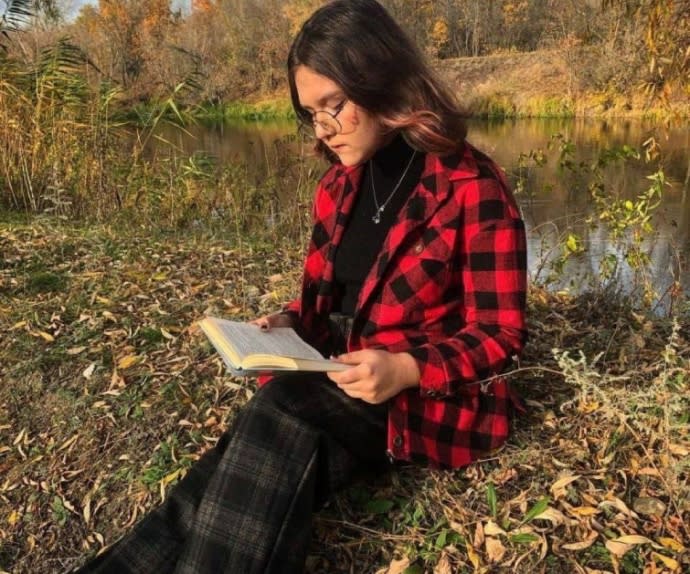
Maria Zhykharieva was a creative girl and loved anime, family archive
Maria Zhykharieva, the young daughter of Oleksandr and Tetiana, was born on 17 March 2008. She was modest, a little shy. She studied at the gymnasium, drew well, attended art school, and was fond of the anime culture.
"Olena and Maria have been very close lately. How did they feel that they still have a little bit left", - says Tetiana Lunina.
"Maria wanted to get enough sleep without the sound of explosions and eat something normal..."
Tetiana says: when the full-scale Russian invasion of Ukraine began, Izium was relatively calm. Olena and her family did not want to evacuate from their hometown, although Dmytroʼs mother asked them to do so.
"We thought then that in a few days it would be over and everything would be fine. We didn't expect events to unfold in this way", - says Tatiana Lunina.
The Stolpakov and Zhykharievy were hiding in the basement of the house during the shelling. We returned to the apartment between the attacks, cooked food, and warmed up.
Marharyta Smoliarova last spoke with her son Dmitry on 6 March. They were chatting on Viber, the connection was poor.
"I asked how are you doing. Dmytro replied: "Stable, normal." Lienochka and my grandchildren congratulated me on my birthday. Dima said they are waiting for a visit on 1 September, because Olesia must be taken to school in the first grade. My son wanted the whole family to unite",—Rita cries.
[BANNER4]On 6 March, Tetiana spoke to her friend on the phone for the last time.
"I offered to leave Izium, but she refused. The city was heavily bombed in those days. We were sitting in the basement, and we didn't know which areas were being hit," the woman recalls.
Polina, a friend of 13-year-old Maria Zhykharieva, says that when they last chatted, the girl was scared. "I wanted to get enough sleep without the sounds of explosions and eat something normal" Polina recalled.
The next day, there was no contact with the family.
"On 7 and 8 March, I tried to call everyone, but I couldn't. My son warned me that this could happen. On the 9th, I started to panic terribly. A million times I dialled the phone numbers of children, matchmakers, and relatives who stayed in Izium. But all in vain" Marharita says with despair in her voice.
Grandma Halyna came to the ruined house everyday to pray and cry
At 07:00 on 9 March, the building at 2, Pershotravneva Street sustained a two-pronged attack: the Russians first used tank guns, and then conducted several airstrikes. Only two parts of the building escaped destruction, the rest of the building was razed to the ground. [Apartment blocks in Ukraine often have several entryways, or pid’izdy, each giving access to apartments located around one stairwell. In this building, only two pid’izdy survived - ed.] Around 50 people were killed in the basement of that building that day. The Zhykharievy and Stolpakovy families were also killed.
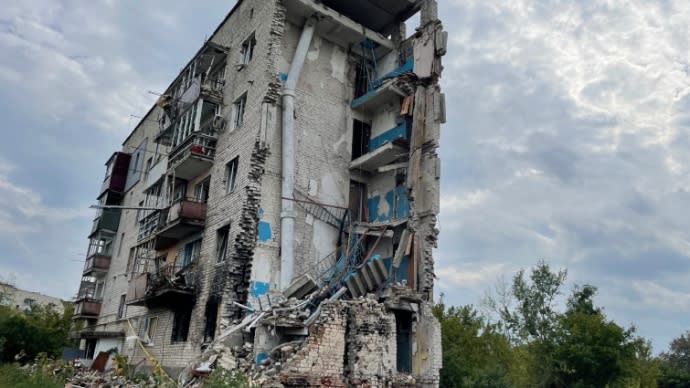
The apartment building at 2, Pershotravneva Street in Izium, destroyed by Russian forces
For over a month, Russian soldiers prevented locals from as much as approaching the ruins. And yet, grandma Halyna, Oleksandr Zhykhariev’s mother, came to 2, Pershotravneva Street every day over the course of a month and a half. She waited and prayed, hoping that her relatives might have survived. And though the Russian soldiers tried to drive her away, she stubbornly came back, again and again, weeping over the building’s ruins.
In early April, local residents started to clear away the rubble with the help of municipal service workers and using primitive equipment. It was nearly impossible to identify the bodies, which were blackened from fire.
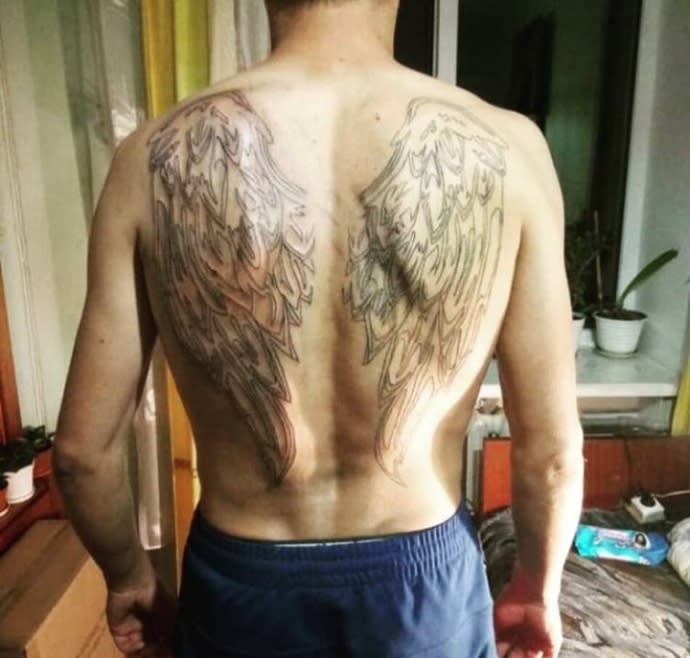
Dmytro Stolpakov’s wings which took him into eternity. Family archive
Halyna’s heart – a mother’s heart – helped her identify her son Oleksandr. She was also able to identify Dmytro and Olena by their distinctive tattoos. Olena had an Arabic saying tattooed on her arm, and a feather on her collarbone. Dmytro had a pair of wings tattooed across his back (a birthday gift from Olena). Grandma Halia was not able to identify Maria and Tetiana Zhykharievy…
"The airstrike split the building in half…People said that when their bodies were found, they laid there side by side," Tetiana Lunina says through tears.
[BANNER5]
"I dreamt that they were walking towards the setting sun…"
Margaryta Smoliarova found out about the death of her relatives in early April. Someone showed her a video on Facebook…
"I thought I would lose my mind! I couldn’t believe it was true until the very end. I couldn’t believe that I would never see my son and my daughter-in-law, that my granddaughters’ hands would never caress my face again," Dmytro’s mother says, crying. She is particularly hurt by not having been able to say goodbye to her family, to bury them.
Family friend Tetiana Lunina says that eventually Olena’s former classmate helped to organise a funeral for Stolpakovy-Zhykharievy. After much pleading, Russian soldiers agreed to mark the graves of those identified by Halyna Zhykharieva with plaques bearing their names; initially they intended to bury all the bodies together in a mass grave.
Tetiana and Maria Zhykharievy, whose bodies had never been identified, were buried in a mass grave…
Tetiana Lunina says that after the tragedy the dead began to appear to her in her dreams.
"Once I thought I could smell Olena’s perfume. I still remember it very well…That night, I had a dream: a red and yellow sunset; I stood behind everyone from the Zhykharievy-Stolpakovy who had died. They were holding hands and walking towards the setting sun," Tetiana Lunina says in a shaky voice.
Lunina recalls that Olena liked to joke that her and Dmytro love each other so much that they will die on the same day, like in Shakespeare’s plays. Coincidentally, local residents sometimes referred to the place by the forest where their bodies were found as "Shakespeare’s".
"[Olena] loved life so much, she never even thought about death. I think about them all the time, and each time I can’t hold back tears. We’ve had so many amazing experiences together. We went to the river near [Izium], to the Shum beach. We camped in tents, made fish soup, laughed, joked around…" the woman says.
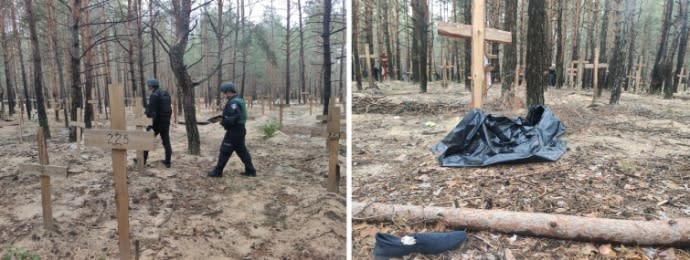
Burial site near Izium created during the Russian occupation of the city. Anna Chernenko
Anna Sliusarenko, Dmytro’s classmate, says that Izium is a depressing city which she had always wanted to escape as it has always been on the edge of the "Russian world" [Russkiy mir, literally "Russian world" or "Russian order," is the concept of total domination of Russian culture over other cultures; it gives rise to and "legitimises" Russia’s current expansionist, colonial politics - ed.]. Rethinking the city’s role in light of the war, Anna finds it difficult to process that while some of her former classmates defended Ukraine or suffered at the hands of the Russian occupiers, like Dmytro and his family, others handed over Ukrainians to the Russian occupiers.
The Stolpakovy family had many plans. Olena wanted to renovate their apartment, even made plans with her friend to choose new wallpaper in spring. The family wanted to go abroad, for a trip to the sea, in the summer.
"They were planning to take Olesia to school on 1 September [the day school resumes after summer holidays in Ukraine - ed.]. When I last visited them, I taught her to write and to count. The first of September was our big dream," Marharyta Smoliarova says with great sadness.
She still has not recovered from this enormous tragedy. She says she keeps going for the sake of her pregnant daughter, who lives in Uman. Both her daughter and her son-in-law took part in the Anti-Terrorist Operation [in Donbas].
"I have to keep going and to help my loved ones," Marharyta says.
Her elder sister still lives in Izium, as does her sister-in-law and her grandchildren. Since Izium has been liberated, the women can now talk to and console one another once again, despite poor phone service.
Marharyta plans to visit Izium in December, to visit her family’s graves. She says that despite everything, she will remember them all with smiles on their faces and full of joy.
This article was prepared by the Memorial platform, which gathers and tells the stories of civilians and soldiers killed by Russia exclusively for Ukrainska Pravda.
Author: Inna Kubay
Translation: Olga Loza, Myroslava Zavadska, Artem Yakymyshyn, Yulia Kravchenko

